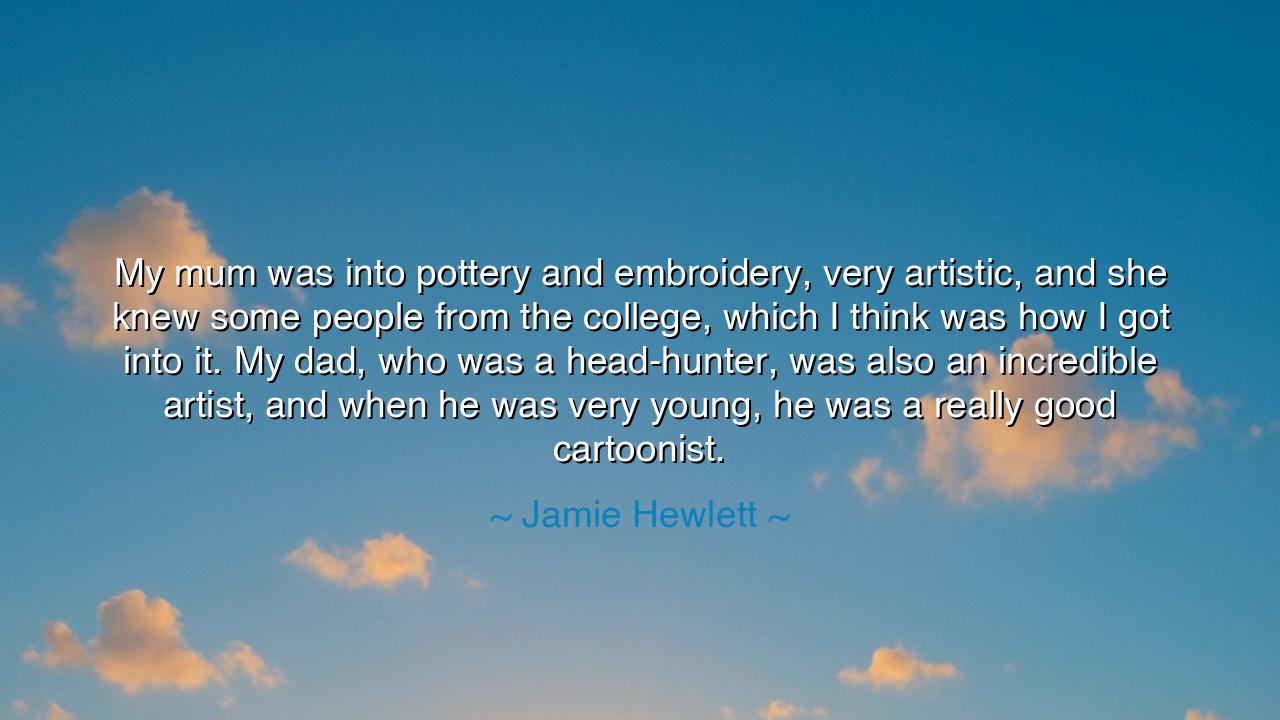
My mum was into pottery and embroidery, very artistic, and she
My mum was into pottery and embroidery, very artistic, and she knew some people from the college, which I think was how I got into it. My dad, who was a head-hunter, was also an incredible artist, and when he was very young, he was a really good cartoonist.






“My mum was into pottery and embroidery, very artistic, and she knew some people from the college, which I think was how I got into it. My dad, who was a head-hunter, was also an incredible artist, and when he was very young, he was a really good cartoonist.” Thus spoke Jamie Hewlett, the visionary artist and co-creator of Gorillaz, whose words unveil the quiet yet profound truth that creativity is an inheritance—not of blood, but of spirit. This reflection is not merely a tale of family; it is a revelation of how the roots of artistry are nurtured across generations, how the unseen touch of a mother’s hands and the quiet dreams of a father’s youth can shape the destiny of a child.
In the ancient way of seeing, such a tale would be called a lineage of the Muses. For in every age, the gifts of the soul are passed like torches from hand to hand, illuminating paths yet unwalked. Hewlett’s mother, shaping clay and weaving thread, worked in silence, yet her art spoke in patterns and forms that her son would one day echo through ink and animation. His father, though dwelling in the world of business, carried within him the same fire—the gift of vision, of humor, of the line that gives life to imagination. Thus, the son did not inherit wealth or titles, but something far greater: the spark of creation that had slumbered in his blood, waiting to awaken.
Consider how the great Michelangelo, born into a modest family of bankers, found his soul’s calling not in coin but in stone. His father disapproved of his art, thinking it beneath their name, yet even so, the creative spirit that stirred within him could not be silenced. Like Hewlett, he was touched by the unseen influence of those before him—mentors, craftsmen, and divine inspiration itself—each adding to the living current that made him one of the immortals. Thus, we see that the artist is both born and made, both gifted and guided, both heir and pioneer.
Jamie Hewlett’s words carry a gentleness, a humility, as though he looks back upon his own beginnings with wonder. He does not claim genius as his own conquest; he acknowledges the threads of destiny woven by his parents’ passions. His mother’s hands molded not only clay, but also his perception of beauty; his father’s early sketches became echoes in his son’s art. This is the way of the world—the talents of one generation flow quietly into the next, and through this continuity, the spirit of creativity never dies.
But the lesson here is not only about inheritance—it is about awareness. Many are born amid art, music, or wisdom, yet few pause to see how deeply these gifts shape them. To recognize where your flame was kindled is to honor the source of your light. The ancients would say, “Know the hearth from which your fire came, and it will never fade.” Hewlett’s recognition of his parents’ influence is not nostalgia—it is gratitude, a sacred act of remembrance that binds the artist to his origin and gives meaning to his journey.
And what of those who were not born into artistic homes? Fear not—for inspiration is not confined to bloodlines. It dwells in the world around us: in the voices of mentors, the stories of friends, the wonders of nature. The soil may differ, but the seed of creativity waits in all who dare to nurture it. The example of Hewlett’s parents shows that every act of creativity, no matter how small or domestic, can awaken the next great vision. The mother who embroiders beauty into cloth may unknowingly embroider courage into the soul of her child.
So let this be the teaching, my friends: honor your origins, but expand them. Seek the threads of artistry, kindness, or courage that lie within your lineage—be it of family, of mentors, or of spirit—and weave them anew into your own tapestry. Do not forget those whose quiet passions opened the path for your own. For the world is built not by single acts of genius, but by countless unseen gestures passed through time—each a whisper, each a spark, each a legacy of light.
In the end, Jamie Hewlett’s words remind us that we are all shaped by the hands that came before us. To recognize this is to live with reverence; to act upon it is to continue the eternal work of creation. So take up your tools—your brush, your pen, your voice—and make something worthy of those who inspired you. In doing so, you not only honor their art—you become part of the sacred chain that binds all creators across time.






AAdministratorAdministrator
Welcome, honored guests. Please leave a comment, we will respond soon